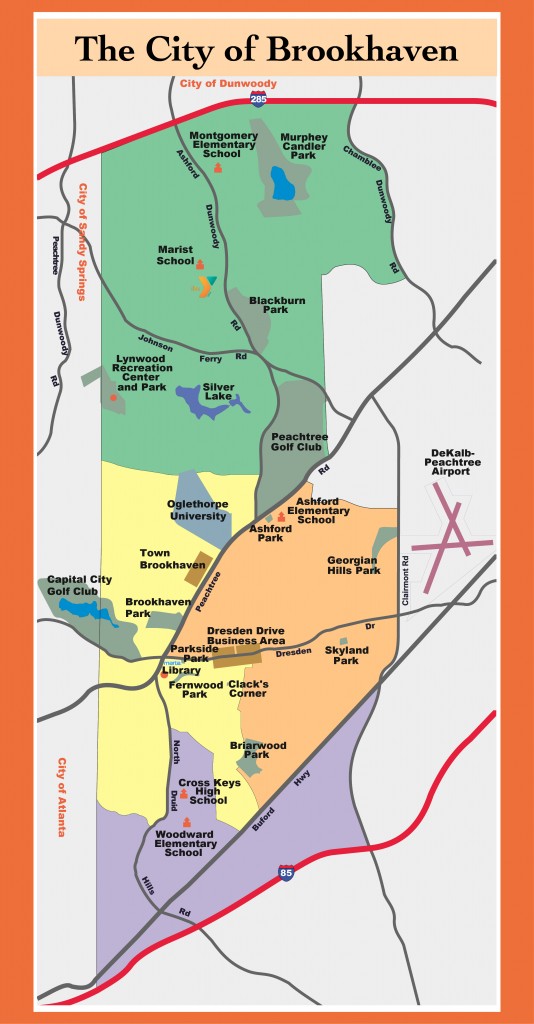The creation of the city of Brookhaven began nearly two years ago. Proponents of the new city ran through a gauntlet of challenges to get to this moment. Reps. Mike Jacobs (R-Brookhaven) and Tom Taylor (R-Dunwoody) sponsored legislation to incorporate the new city, but the bill spent months being processed by the state Legislature before it passed. Opponents mobilized, galvanizing enough “No” votes in the July 31, 2012, referendum to come within 1,000 votes of stopping the new city in its tracks. Here are some pivotal events that made Georgia’s newest city a reality:
2011
March:
Reps. Jacobs and Taylor introduce a bill that would give voters the option to incorporate a new city.
May:
Polls commissioned by Jacobs show 64 percent support for the city, but other polls show a sizeable opposition to the idea. A nonprofit group, Citizens for North DeKalb, forms to raise money for a feasibility study to be completed by the Carl Vinson Institute of Government at the University of Georgia.
June:
Rep. Elena Parent hosts a debate at Oglethorpe University to discuss the cityhood question. More than 150 people attend.
November:
Citizens for North DeKalb publishes the Vinson Institute study. The study estimates that a city of Brookhaven will run a surplus of $3.4 million each year. Jacobs introduces a timetable that sets a Dec. 17, 2012, start date for the city if voters choose to incorporate. The DeKalb County Commission requests a moratorium on new cities in the county to study their effect on county services.
December:
Residents begin forming groups both for and against cityhood.
2012
January:
The pro-cityhood group Brookhaven Yes forms. The state House of Representatives Governmental Affairs Committee holds its first hearing on the Brookhaven bill and discusses the Vinson Institute’s study.
February:
The House Governmental Affairs Committee holds a second hearing in front of a standing-room-only crowd of both supporters and opponents of the idea. The committee amends the bill to change the name from Brookhaven to Ashford to avoid confusion with the Historic Brookhaven neighborhood.
March 8-29:
Rep. Mike Jacobs redraws the proposed city maps to have four council districts instead of three. The state Senate changes the city’s name back to Brookhaven. No City Brookhaven forms to oppose cityhood. The state Legislature approves the city of Brookhaven bill.
April 16:
Gov. Nathan Deal signs the city of Brookhaven bill, setting the stage for a July 31 referendum.
July 10-20:
More than 200 residents show up to Oglethorpe University for a forum hosted by the Brookhaven Reporter to debate the cityhood question. Brookhaven Yes begins making plans to address problems the new city could face. Finance forms show No City Brookhaven raising more money and outspending Brookhaven Yes.
July 31:
Brookhaven residents approve incorporation, 55 percent to 45 percent.
August:
More than two dozen candidates register to run for mayor and the four city council seats. Gov. Nathan Deal appoints a five-member commission to lay the ground work for the new city until elected officials can take over.
September:
The Governor’s Commission on Brookhaven holds its first meetings.
October:
The Governor’s Commission on Brookhaven issues requests for proposals from companies interested in bidding on contracts to perform city services. The campaigns for Brookhaven City Council seats kick into high gear.
Nov. 6:
General election for the Brookhaven City Council. The only candidate who wins outright is Jim Eyre in District 2. The rest face runoff elections in December.
Nov. 7:
Governor’s Commission on Brookhaven adopts its formal report for the city.
Nov. 23:
Governor’s Commission on Brookhaven receives bids for city services.
Dec. 4:
Voters elect J. Max Davis to the post of mayor and elect council members Rebecca Chase Williams in District 1, Bates Mattison in District 3 and Joe Gebbia in District 4.
Dec. 17:
Brookhaven officially opens for business.

